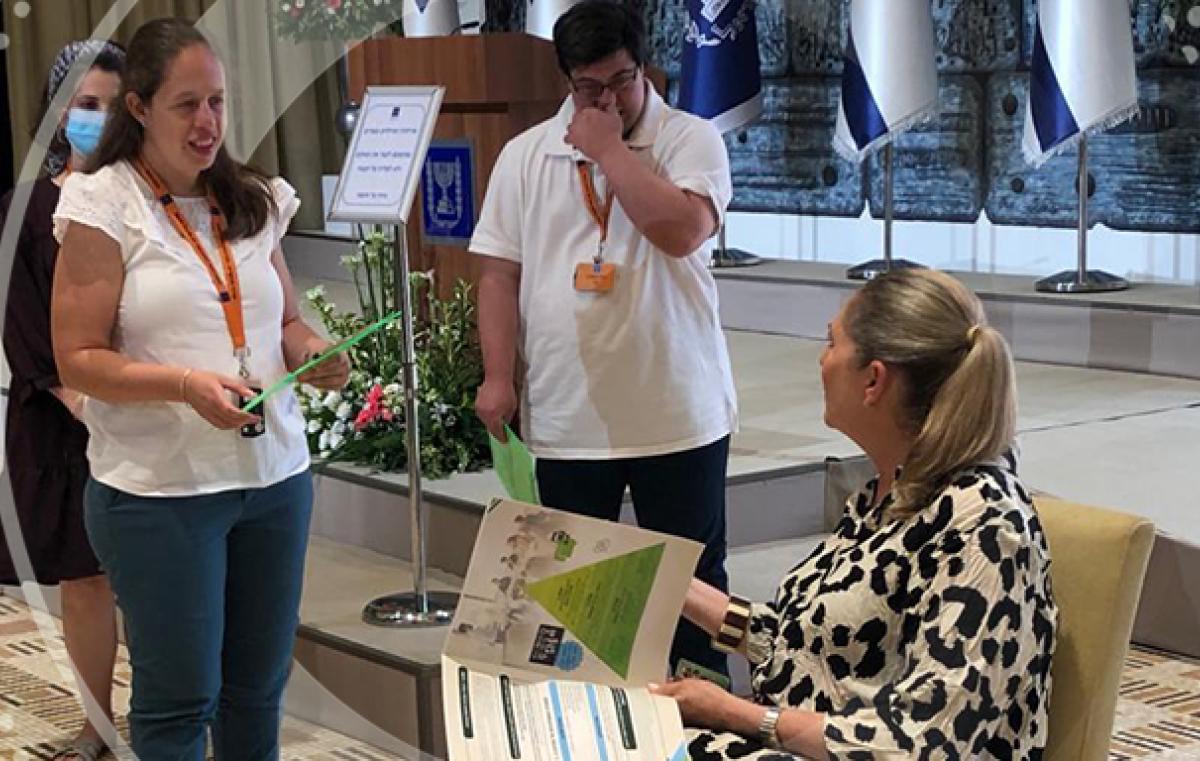Otzmot Academic Project for People with Intellectual Disabilities
BIU study shows that academic education raises the IQ of people with intellectual disabilities

Michal Herzog, wife of the President of the State of Israel, recently hosted students pursuing a bachelor’s degree in the framework of the Otzmot project, which integrates people with intellectual disabilities into academia. This unique project was born and developed at Bar-Ilan University’s Faculty of Education, which also runs Israel’s only MA specialization in intellectual disability. The students presented First Lady Michal Herzog with a first-of-a-kind study, which found that it is possible to improve mainly the cognitive capabilities of people with intellectual disabilities.
At the meeting which took place at the President’s Residence, Herzog hosted six students with and without Down Syndrome, who are studying for a multidisciplinary bachelor’s degree in social sciences, in the framework of BIU’s Otzmot project. The visit was preceded by a tour of the President’s Residence, followed by a discussion in which the students presented the various stages of the project, and the groundbreaking research that shows that students with ID experience a boost in IQ as a result of participating in the program. At the end of the visit, Herzog promised to attend the students’ graduation ceremony.
Significant Improvement in IQ
Prof. Hefziba Lifshits, who heads the MA Specialization in Intellectual Disability at BIU’s Faculty of Education, explains that contrary to the conventional approach toward people with intellectual disabilities, Otzmot aims to broaden their cognitive capabilities, and not just maintain them. Prof. Lifshitz relates that the project also encompasses research that began four and a half years ago. “The unique project started as an initiative to enable people with cognitive disabilities to participate in university classes without an academic commitment.” Since then, the project has grown, and its success has led to the formation of a select group of people with intellectual disabilities studying for a bachelor’s degree. “We tested the IQ level of the participants, and we repeated the test after they spent a few years of studies in the program and found a significant increase. According to the findings, their IQ even surpassed the IQ threshold for intellectual disability and with regard to certain abilities, such as the general IQ and verbal competency, the improvement was particularly significant.”
Today, there are 100 graduates with intellectual disabilities, including some persons with Down Syndrome, studying at Bar-Ilan university at various levels – from enrichment courses to an academic degree (director: Dr. Shoshana Nissim). Six students participate in the academic degree program. In addition, there is also “Otzmot in Zoom”. This program is designed for those who live far from the university.
The Goal: To Change the Attitudes of Professionals
Prof. Hefziba Lifshitz, who heads the Intellectual Disability MA Program at the BIU Faculty of Education, also serves as incumbent of the Lois Alberto Machado Research Chair on Cognitive Modifiability and Human Development Delays. She says “the unique master’s degree program in Intellectual Disability is designed to change the attitudes of professionals, including educators, kindergarten teachers, health care professionals and social workers, toward the inherent abilities in students and graduates with ID and those with borderline intellectual disabilities. The program equips them with theoretical and empirical information about the capabilities of those with ID, in order to help them develop their cognitive skills.”
Prof. Lifshitz notes that the program operates in accordance with the principles of the United Nations Convention on the Rights of Persons with Disabilities, published in 2006, which calls for ensuring “the development by persons with disabilities of their personality, talents and creativity, as well as their mental and physical abilities, to their fullest potential.”
During the degree studies, the students learn innovative theories in the field of education, genetics and neuroscience relevant to intellectual disability. In addition, they acquire knowledge about the narrative languages, and emotional thinking of people with intellectual disabilities, diagnosis of reading difficulties and development of an intervention program for persons who need an extensive support with severe and profound ID.
The degree is designed for teaching staff, those who work with the elderly, paramedical professionals, speech therapists, occupational therapists, physiotherapists, social workers, and in fact, for all graduates of a bachelor’s degree in the social sciences.
On Monday, September 12, a conference will be held for the MA Specialization in Intellectual Disability. The conference will be held on Zoom and will focus on the topic, “Academic Education for People with Disabilities – from Vision to Implementation and Research.” Conference participants will include Israeli Member of Knesset Michal Woldiger and Rabbi Dr. Binyamin (Benny) Lau, chairman of AKIM.
For further information on the MA program